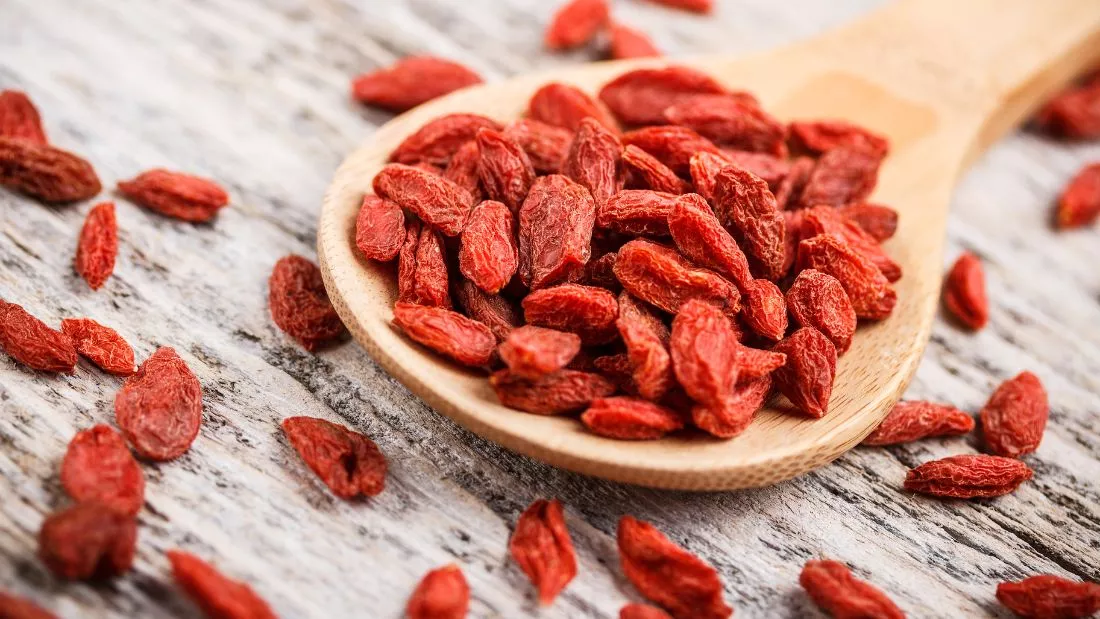Goji berries

These bright red berries became popular due to their alleged high nutrient content and multiple health benefits but do they live up to the reputation?
The goji plant is a hardy shrub native to China where it has been cultivated for at least 4,000 years. According to Chinese folk wisdom, goji berries are believed to ensure longevity. Since around the year 2000, goji berries started becoming popular in Western countries thanks to many – mostly unsubstantiated – health claims and now goji berries have a firm place on the market. Fresh goji berries have a very short shelf-life so they are almost always sold and consumed dried.
The English term wolfberry has an unknown origin, while the word goji comes from the transcription of the Chinese name of the berry and is used internationally.
Goji berries nutrients
So what’s in a tablespoon of dried goji berries? The main stars are antioxidants but when it comes to other nutrients, goji aren’t that rich a source of any. A tablespoon offers small amounts of B vitamins, vitamin A (as carotenoids that the body converts to vitamin A), vitamin C and minerals, such as calcium, magnesium and potassium. But the amounts are truly small unless you consume these berries in large quantities.
You may find sources that claim goji berries are an excellent source of vitamin C but that’s only true if you eat the whole pack in one sitting which is not only difficult to achieve but also expensive!
Goji berries are, however, a good source of antioxidants – natural compounds that protect your cells from damage caused by free radicals which result from normal metabolism as well as environmental pollution. The main ones include polyphenols, carotenoids and specific polysaccharides that also have other health-beneficial properties.
The most abundant carotenoid in goji is zeaxanthin and it’s particularly effective at protecting the eyes. Studies found that regular goji consumption can help protect you from age-related macular degeneration which is a condition affecting the retina and causing vision issues.
There are also a few studies indicating that goji antioxidants may help to lower your risk of heart disease by lowering cholesterol levels and protecting blood vessel walls but more research is needed to support these results.
Several studies found that goji extract was able to stop the growth of cancer cells in laboratory tests so it’s possible that goji consumption may help to protect you from cancer. While this sounds promising and goji berries can help strengthen your defences, they are not a cure for cancer.
According to research studies, goji polysaccharides stimulate your immune system and make it more effective and also have anti-inflammatory effects. Their consumption therefore likely has multiple health benefits but it’s unclear what the effective dose should be.
There are many other claims about goji berries, some stemming from their traditional use in Chinese medicine, others from animal experiments but there simply aren’t reliable human data to either support or reject them.
Who should avoid goji berries?
People taking Warfarin or other blood thinners shouldn’t consume goji berries as they may interfere with the drugs. The same applies to a number of diabetes and blood pressure medications, so if you do take those, talk to your doctor or pharmacist first.
If you are pregnant, small amounts of goji berries are probably safe but don’t overdo it – goji berries contain betaine, a substance that can cause uterine contractions and increase the risk of miscarriage. There aren’t enough human data to be more specific, so it’s best to either consume only small portions occasionally or avoid goji altogether to be completely safe.
Ethical issues with goji berries
Goji have a low carbon and water footprint and are very sustainable. Although they are also grown in Europe, the main producer is China followed by a range of other countries. Farm workers are often underpaid and overworked but it’s impossible to tell how your goji berries were produced unless you buy a Fair Trade product. If it’s available to you, choose organic and Fair Trade goji berries, so you know the workers get a fair wage and the environment isn’t poisoned by pesticides.
How to make goji berries a part of your diet?
Dried goji berries are easy to use – sprinkle a tablespoon on your morning cereal, stir some into chia pudding, blend them in a smoothie, throw a handful into home-made flapjacks, granola or pancakes or just nibble a few with your daily small handful of nuts and seeds. You can also buy cold-pressed goji juice that’s made from fresh goji berries and so is higher in antioxidants.




